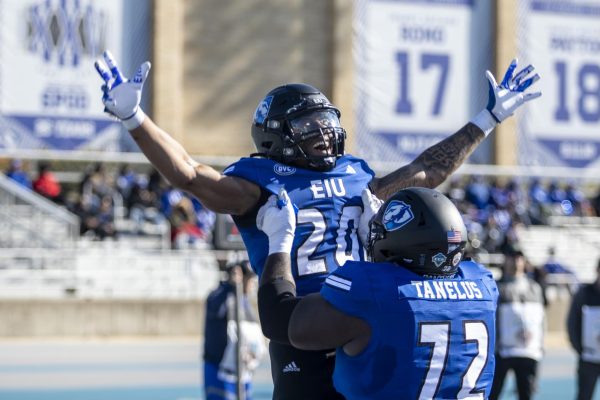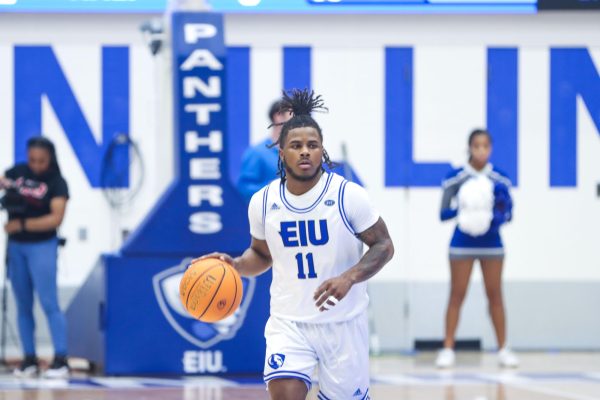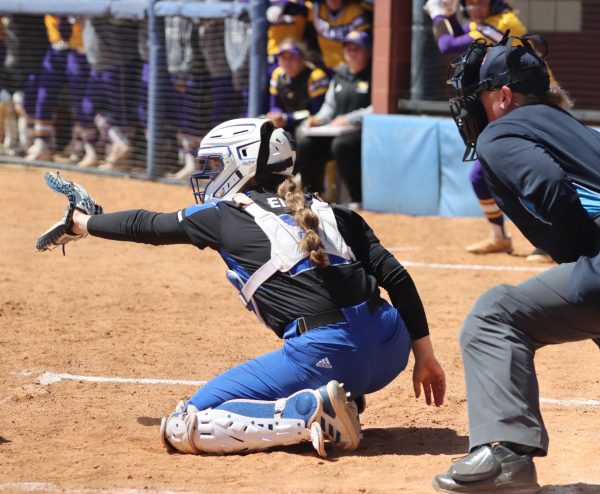Johnson has ISU football on track
Denver Johnson would do it again if given the chance.
His right tackle was throwing up.
His quarterback nearly fumbled a snap and almost threw an interception on the drive.
Add to the fact that 47,250 anxious Kansas State football fans were watching with anticipation while Illinois State’s head coach made the call.
“I’ve never lost one moment’s of sleep because of it,” he said.
That call to go for a two-point conversion after Pierre Jackson’s three-yard touchdown catch instead of attempting the extra point decided the outcome of Illinois State’s 24-23 season-opening loss at Kansas State last year.
Johnson went to a quarterback draw from Luke Drone instead of an extra point attempt from kicker Jason Mazur. Drone’s rushing attempt fell short, with a little more than three minutes left in the game and with it, ISU’s chance to upset Kansas State.
Illinois State got the ball back, but couldn’t find an offensive rhythm, turning the ball over on downs.
The decision to go for the conversion instead of kicking the extra point brought up some interesting questions to Johnson after the game.
“Someone asked me why I went for two and I said because I was trying to win the darn game,” Johnson said earlier this week. “There’s absolutely no reason to go to overtime unless it actually enhances your chances of winning that game. Our chances of winning that game were right there.”
Johnson has turned around a football program with what he calls a “fairly dismal history” into a consistently nationally ranked team during his eight years at ISU.
And Johnson’s teams at Illinois State and Murray State, where he coached from 1997-99, have dominated Eastern. Johnson has a combined 9-1 record against Eastern as a head coach and will have a chance to go 10-1 this Saturday when Eastern hosts the Redbirds.
“What Coach Johnson has done is incredible,” Eastern defensive coordinator Roc Bellantoni said. “Obviously he’s doing something right. They get very good players, and they tend to play well, especially against us.”
Johnson had success at Murray State, compiling a 21-12 record in his three years there. Right around the time Johnson had success at Murray, then-Illinois State head coach Todd Berry was having surprised success in Normal. Berry had back-to-back winning seasons in 1998 and ’99, leading the Redbirds to their first-ever playoff appearances.
After ISU reached the I-AA semifinals in 1999 (now the Football Championship Subdivision), Berry left to become head coach at Army.
Johnson left Murray and replaced Berry in 2000, compiling a 7-4 record in his first season.
Johnson had two losing seasons as ISU’s head coach, but his team last year reached the playoffs for the first time since Johnson has been at ISU.
“I think what we’ve attempted to do is build a good program, one that has staying power,” Johnson said. “There was still a lot of internal program building to be done, academically and otherwise. We’re kind of focused in a little bit of the long haul.”
Drone said the first time he met the 48-year-old Johnson, an Oklahoma native who played his college ball as an offensive lineman at Tulsa in the late-70s, he thought of his future coach as a “stand-up guy.”
Drone said Johnson has an easy-going personality about him that players can relate to.
“We definitely have more of a closer relationship since you get to know him every year,” he said. “It’s one of those things that if I ever need anything, I can come to him.”
Redbirds linebacker Kye Stewart, originally from Nashville, Tenn., said Johnson’s Southern accent and his family-oriented style of coaching has grown on him.
“He’s always been so open,” Stewart said. “It just kind of reminds me of home a bit.”
Right now, Johnson’s home is in Bloomington and he’s intent on maintaining Illinois State’s success.
He said he has received some offers from bigger schools to coach, but nothing he was interested in.
The story of his predecessor Berry also is close to Johnson. After leaving ISU to coach at Army, Berry went 5-35 in three-and-a-half years and was fired halfway through the 2003 season. Since then, Berry has coached at three different schools in a coordinator role.
“I think I’m in a pretty unique spot,” he said. “I make a good living. I’m not getting rich, but I have no desire to get rich. I think in this business, if you go chasing the dollar, you make poor decisions.”











































